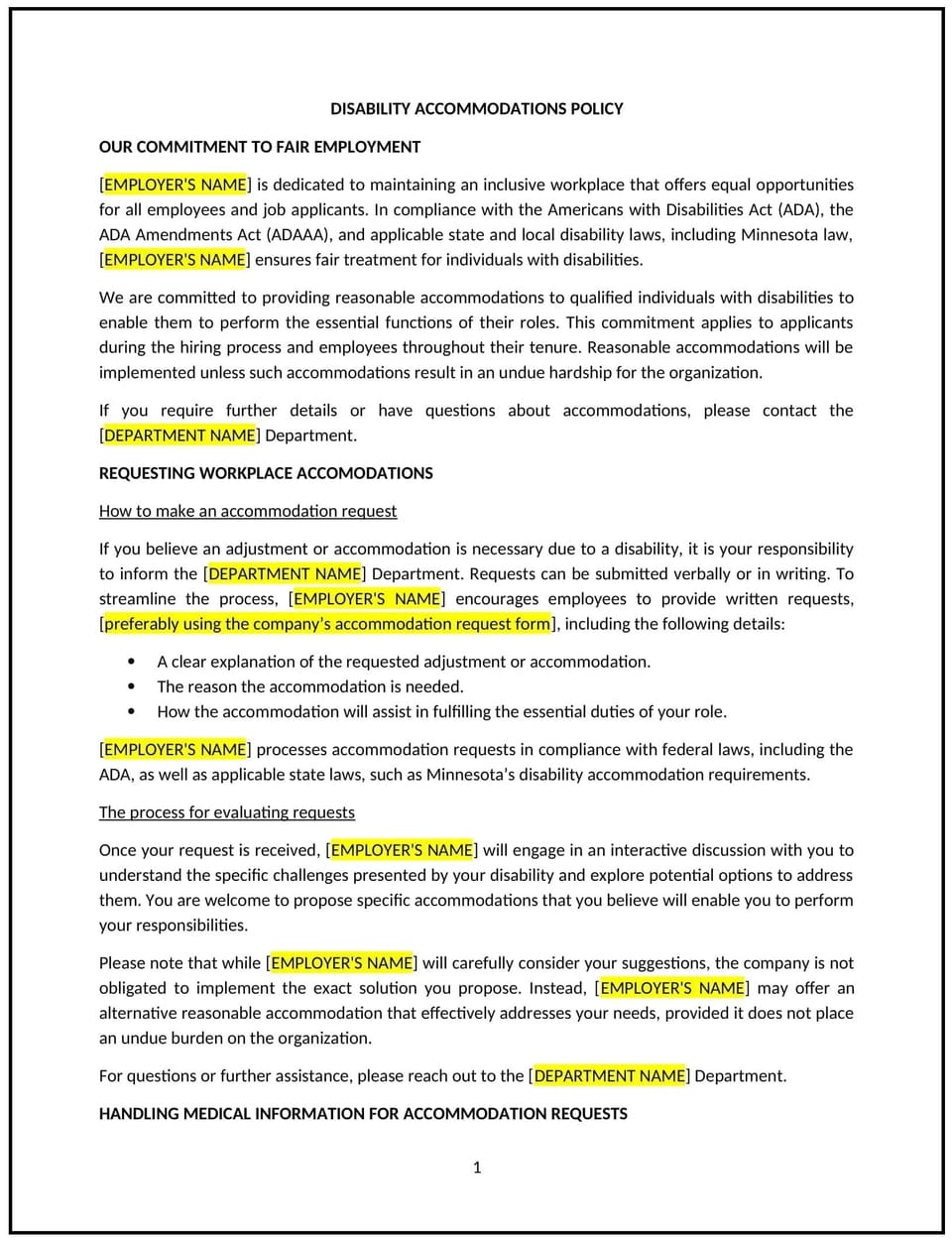Disability accommodations policy (Minnesota): Free template

Disability accommodations policy (Minnesota)
This disability accommodations policy is designed to help Minnesota businesses provide reasonable accommodations for employees with disabilities to ensure they can perform their job functions effectively. It outlines the process for requesting accommodations, the types of accommodations that may be provided, and the responsibilities of both employees and employers.
By implementing this policy, businesses can foster an inclusive work environment, improve employee retention, and comply with local and federal laws regarding disability rights.
How to use this disability accommodations policy (Minnesota)
- Define disability and accommodations: Clearly define what constitutes a disability under Minnesota state law and the types of accommodations the company may provide, such as adjustments to work schedules, physical workspace modifications, or assistive technologies.
- Set the request process: Outline the steps employees should take to request accommodations, including whom to contact, any required documentation, and expected response timelines.
- Address confidentiality: Ensure that employees' medical information or disability status is kept confidential, with only necessary personnel involved in the accommodation process.
- Provide examples of accommodations: Include examples of possible accommodations, such as flexible work hours, ergonomic workstations, or the use of assistive devices, and explain how each might be evaluated based on individual needs.
- Clarify the interactive process: Establish a clear process for dialogue between the employer and employee to determine the most appropriate accommodation, ensuring that both parties are actively involved.
- Specify undue hardship: Outline the circumstances under which the company may not be able to provide a specific accommodation due to undue hardship, such as significant cost or operational impact.
Benefits of using a disability accommodations policy (Minnesota)
Implementing this policy provides several advantages for Minnesota businesses:
- Promotes inclusivity: Supports employees with disabilities by providing the tools and resources they need to succeed in the workplace.
- Enhances employee satisfaction: Offering accommodations fosters a more supportive work environment, leading to higher employee morale and retention.
- Reduces legal risks: Helps businesses comply with local, state, and federal regulations, reducing the risk of legal action related to disability discrimination.
- Improves productivity: By providing employees with the necessary accommodations, businesses can improve overall performance and ensure that employees can contribute to their full potential.
- Reflects Minnesota-specific considerations: Adapts the policy to Minnesota’s specific disability-related laws and cultural expectations regarding workplace inclusivity.
Tips for using this disability accommodations policy (Minnesota)
- Communicate clearly: Ensure that employees are aware of the accommodations process, how to request accommodations, and their rights under the policy.
- Encourage an open dialogue: Create an environment where employees feel comfortable discussing their accommodation needs without fear of discrimination or retaliation.
- Keep documentation organized: Maintain accurate records of accommodation requests, including any supporting documentation, communications, and decisions made during the process.
- Evaluate on a case-by-case basis: Each accommodation request should be assessed individually to ensure the employee’s specific needs are met in a reasonable and effective manner.
- Update regularly: Review and update the policy periodically to ensure it reflects any changes in disability laws or Minnesota-specific requirements.
Q: How should employees request accommodations under this policy?
A: Employees should submit a formal request to HR or their supervisor, detailing the accommodation needed and providing any necessary medical documentation or explanations of how the disability affects their ability to perform their job.
Q: What types of accommodations can be provided?
A: Accommodations may include modifications to the work environment, changes to job duties, flexible work hours, assistive technology, or any other adjustment that helps the employee perform their role effectively.
Q: Is the company required to provide any accommodation requested by the employee?
A: While businesses should strive to accommodate employee needs, they are not required to provide accommodations that would cause undue hardship, such as significant financial costs or disruption to business operations.
Q: How long does the accommodation process take?
A: The company should respond to accommodation requests promptly, ideally within a few days to a week, depending on the complexity of the request and the need for additional documentation.
Q: Can an employee request an accommodation at any time during their employment?
A: Yes, employees can request accommodations at any time if their needs change or if they experience new challenges related to their disability.
Q: Will my medical information be kept confidential when requesting accommodations?
A: Yes, all medical information related to an accommodation request will be kept confidential and shared only with those involved in the accommodation process on a need-to-know basis.
Q: What happens if the company cannot provide the requested accommodation?
A: The company will engage in an interactive process with the employee to explore alternative accommodations that may meet their needs, or the company may determine if the requested accommodation would cause undue hardship.
Q: How often should this policy be reviewed?
A: The policy should be reviewed annually or whenever there are changes to Minnesota’s disability-related laws or the company’s operational needs.
This article contains general legal information and does not contain legal advice. Cobrief is not a law firm or a substitute for an attorney or law firm. The law is complex and changes often. For legal advice, please ask a lawyer.


